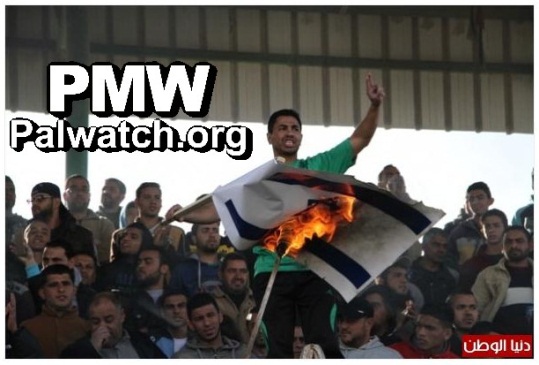Palestinians burn Israeli flag, celebrate fires raging in "the Palestinian territories that were occupied in ’48"
Headline: “In pictures: The fires in the occupied territories are spreading to the bleachers in Gaza”
“The Palestinian public responded to the fires raging (i.e., a wave of Palestinian arson attacks in November 2016) in the Palestinian territories that were occupied in ’48 (i.e., Israel), which have become the topic of the day in the international, Arab, and local media outlets, with the burning of the flag of the [Israeli] entity state during games of the League in the Gaza Strip.During the meet of Khidmat Rafah with its counterpart Khidmat Khan Younis that was held today, Friday afternoon [Nov. 25, 2016], at the municipal grass field of Rafah in the center of the Rafah district in the Gaza Strip, [the spectators] burned the flag of the Israeli entity and chanted calls against the occupation state, in addition to sounding calls to prayer on the field before the beginning of the game in response to the occupation’s decision to ban [the sounding of] the prayer calls (the “Muezzin Law,” see note below –Ed.) in Jerusalem."

The picture shows a Palestinian spectator burning an Israeli flag in the bleachers at a game in Rafah in the Gaza Strip.
On Nov. 13, 2016, a bill to ban religious institutions from broadcasting over loudspeakers was approved for a preliminary reading in the Israeli Parliament. The bill is intended to prevent noise pollution. This bill is referred to by many as the "Muezzin Law," although it does not refer to any specific religion.
Other countries have already approved or attempted legislation for regulating the use of loudspeakers in mosques in order to limit noise pollution. These include India, Nigeria, Saudi Arabia, Egypt, Jordan, Syria, Turkey, Bahrain, the United Emirates, the Netherlands, Germany, Switzerland, France, the UK, Austria, Norway, and Belgium, and the US. The PA has also passed legislation regarding the use of loudspeakers in mosques in order to reduce noise pollution.